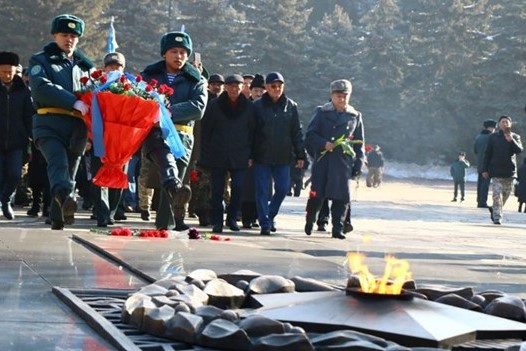This past week, Central Asian veterans of the Soviet-Afghan war observed the 34th anniversary of the conflict’s official end, the Taliban government struck yet another rail deal, and diplomacy between Afghanistan and Uzbekistan remained chill.

Service members lay a wreath of flowers in Panfilov park. Image source: Zakon.kz
This week, most of the news regarding the connection between Central Asia and Afghanistan focused on one of the most formative and consequential events in the region’s modern history: the Soviet-Afghan war. February 15th marked 34 years since the 1989 withdrawal of the last Soviet troops from Afghanistan. The Soviet Union invaded Afghanistan in December 1979 to replace the authoritarian President Hafizullah Amin with the preferred Babrak Karmal, but quickly became mired in a 9-year war of attrition against the Afghan mujahideen. The conflict killed upwards of 2 million Afghans and nearly 15,000 Soviet soldiers.
All across Central Asia ceremonies marking the event took place. More broadly, these gatherings served also to honor the veterans of the war. In Almaty’s Panfilov park, a wreath-laying ceremony was carried out, with many veterans present (Zakon). Approximately 20,000 Kazakhstanis served in Afghanistan – nearly 1000 died. Ceremonies were also held in numerous other Central Asian cities, such as Bishkek & Tashkent.
Railroad travel and commerce is a sphere through which the Taliban government of Afghanistan is eager to build ties with its Central Asian neighbors. This week it was reported that the Afghan Railway Authority and Turkmen Railways struck a preliminary agreement to increase the number of trains and trade on the Serhetabat-Turgundi railroad, which connects Afghanistan’s Herat province to southern Turkmenistan (Turkmen Portal). This news comes on the heels of a spate of contracts, accusations, and renegotiations regarding railroads between Afghanistan and Uzbekistan.
Dialogue and cooperation between Uzbekistan and Afghanistan continue, but not without challenges. A statue of the famous Timurid-era poet Ali-Shir Nava’i was demolished in the northern Afghan city of Mazar-i-Sharif (NUZ.UZ). Nava’i is cherished as a beloved national figure in Uzbekistan. Akhror Burkhanov, press secretary of the Uzbek Minister of Foreign Affairs, commented that the situation was regrettable. According to him, Taliban officials assured the Uzbek government that the vandalization was the act of individuals, and did not represent official government policy.

